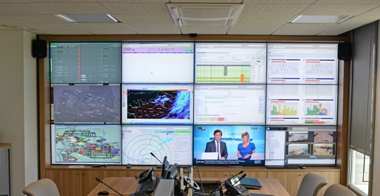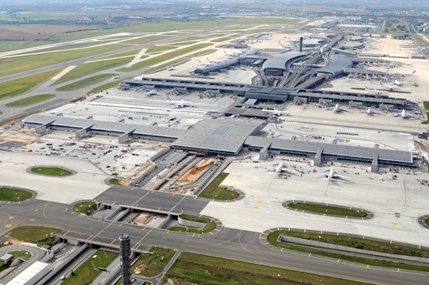|
CDM@CDG A PARIS-CHARLES DE GAULLE |

|
Historique
|
La mise en place opérationnelle le 16 novembre 2010 des concepts Collaborative Decision Making (CDM) préconisés par Eurocontrol a concrétisé l'aboutissement d'une démarche initiée en 2005 incluant l'ensemble de la communauté aéroportuaire unie au service d'un même projet : partager en temps réel l'information pour fluidifier l'écoulement du trafic sur Paris-Charles de Gaulle aussi bien en conditions nominales qu'en situations dégradées.
Les acteurs sont tous engagés à différents degrés de par leurs décisions ou leurs actions dans la maîtrise de l'écoulement du trafic de l'aéroport. Dans ce contexte, il est apparu évident à chacun d'adhérer à une démarche collaborative CDM afin d'améliorer le fonctionnement local de Paris-Charles de Gaulle mais également son intégration dans le réseau aérien européen.
|

|
Pour permettre le déploiement du CDM sur la plateforme de Paris-Charles de Gaulle, l'ensemble des partenaires compagnies aériennes, gestionnaire d'aéroport et navigation aérienne ont développé sur la plateforme une culture du partage d'informations ainsi que des outils et procédures communs sur les sujets suivants :
- le partage de l'information et la collaboration opérationnelle entre les acteurs
- la mise en place d'une séquence des départs collaborative
- l'optimisation de la capacité en situation nominale
- la gestion des conditions dégradées.
Collaboration opérationnelle
Sur la plateforme de Paris-Charles de Gaulle, la collaboration opérationnelle est présente en conditions nominales et elle est renforcée lors des situations dégradées ; elle se déroule en temps réel mais également en temps différé lors des retours d'expérience communs.
En situation nominale, la collaboration entre les acteurs se concrétise par deux points de situation quotidiens à 12h40LT et à 19h30LT. Les conclusions de ces réunions téléphoniques, faites entre le Responsable Opérationnel des Aires Aéronautiques d'Aéroports de Paris, le Chef de l'approche des Services de la Navigation Aérienne et le Responsable opérationnel du Centre de Contrôle des Opérations d'Air France sont systématiquement disponibles sur ce présent site web CDM quelques minutes après la fin de la réunion.
|
Lorsque les conditions sont dégradées, les acteurs opérationnels décident de se réunir au sein d'une salle de décision dédiée : le plateau CDM. Son principal enjeu est l'amélioration de la communication entre les acteurs pour faciliter les analyses communes et les prises de décisions.
Le plateau CDM est équipé de 16 positions pour l'accueil du personnel d'Aéroports de Paris, des Services de la Navigation Aérienne, des compagnies aériennes ou des assistants.
Il est également équipé d'un mur d'images permettant par exemple la retransmission d'indicateurs sur le trafic ou encore des prévisions météorologiques, informations essentielles lors des conditions givrantes.
|

|
Enfin sur Charles de Gaulle, la collaboration entre les différentes organisations a également lieu a posteriori, au cours des réunions mensuelles d'exploitation où l'ensemble des protagonistes opérationnels sont invités pour échanger sur les situations passées et proposer le cas échéant des axes d'amélioration.
Gestion des départs collaborative (GLD-C)
La GLD-C est en ensemble d'outils et de procédures qui permettent de créer sur Paris-Charles de Gaulle une séquence des vols au départ disponible en conditions nominales et dégradées.
L'outil GLD calcule un horaire réaliste de départ bloc pour chaque vol qui tient compte de la programmation du COHOR (association pour la coordination des horaires sur Paris-Charles de Gaulle), des créneaux de départ attribués par le Network Manager (organisme européen de gestion centralisée des flux de trafic) mais également de l'ensemble des contraintes qui peuvent s'appliquer sur le vol : capacités des pistes, conditions météorologiques, impératif des compagnies.

|
Cette séquence est automatiquement partagée avec le gestionnaire du réseau européen ce qui permet une meilleure intégration des opérations de Paris-Charles de Gaulle et un traitement privilégié de celles-ci : les vols en provenance d'un aéroport CDM reçoivent moins de contraintes de la part du gestionnaire, la ponctualité des vols s’en trouve améliorée.
Le système GLD garantit également une fluidité de trafic au sol, une réduction du temps de roulage et une réduction du temps d'attente au seuil de piste lors des fortes pointes de trafic. Ceci a engendré des gains opérationnels et environnementaux très conséquents sur Paris-Charles de Gaulle :
- une amélioration de la sécurité
- une amélioration de la ponctualité
- une diminution de la consommation de carburant et des émissions de gaz à effet de serre : l'attente au point de parking moteurs éteints est privilégiée, l'attente au seuil de piste est donc maîtrisée.
Paris-Charles de Gaulle a chiffré sur 2011 une économie de 9 tonnes de carburant par jour soit 32 tonnes de CO2.
|
La séquence GLD ainsi que d'autres informations sur la situation opérationnelle de Paris-Charles de Gaulle sont disponibles pour nos partenaires sur le site web, n’hésitez pas à demander l'accès en cliquant sur ce lien Demande de création de compte
| CDM@CDG AT PARIS-CHARLES DE GAULLE |
 |
Background
On 16 November 2010, the “Collaborative Decision Making” system (CDM) recommended by Eurocontrol came into operation, the culmination of a process which started in 2005 involving the whole airport community working together on the same project: sharing real-time information in order to ensure traffic flows smoothly at Paris-Charles de Gaulle in normal and difficult situations.
The stakeholders are all involved in varying degrees, through their decisions or actions, in the airport traffic flow management. Within this context, it became clear that everyone should belong to a CDM system to improve not just the local operation of Paris-Charles de Gaulle but also its integration into the European air network. |
 |
To enable CDM to be implemented at Paris-Charles de Gaulle, all airline partners, the airport operator and air traffic control have developed a culture of sharing information on the airport site as well as common tools and procedures on the following themes:
- sharing of information and operational collaboration between stakeholders
- setting up collaborative pre-departure sequencing
- optimising capacity in normal situations
- management of adverse conditions.
Operational collaboration
At Paris-Charles de Gaulle, operational collaboration is present in normal conditions and stepped up in adverse situations: it takes place in real time as well as non-real time during joint feedback.
In normal situations, collaboration between stakeholders takes place with two daily updates at 12.40 p.m. LT and 7.30 p.m. LT. These telephone meetings are held between the Operations Manager of the Aeronautics Areas of Aéroports de Paris, the Head of the Air Navigation Services System and the Air France Operations Manager of Air Operations Control Centre, and their conclusions are systematically available on this CDM website a few minutes after the meetings finish.
When there are adverse conditions, the operational stakeholders decide to meet up in a dedicated decision-making room: the CDM base. Its main purpose is to improve communication between the stakeholders to facilitate joint analyses and decision-making.
The CDM base is equipped with 16 stations to accommodate Aéroports de Paris staff, from air traffic control, airlines or assistants.
It is also fitted with a monitor wall enabling, for example, traffic indicators or even weather forecasts to be displayed, essential information when there are icy conditions. |
 |
Finally at Paris-Charles de Gaulle, collaboration between the various organisations also takes place after the event, during monthly operations meetings where all the line managers are invited to discuss past situations and, if necessary, suggest improvement priorities.
Collaborative pre-departure sequencing (PDS)
The collaborative pre-departure sequence is a set of tools and procedures which allows a sequence of outbound flights to be created at Paris-Charles de Gaulle available in normal and adverse conditions.
The collaborative pre-departure sequence tool calculates a realistic off-block departure schedule for each flight which takes into account the COHOR programming (Schedule Coordination Association at Paris-Charles de Gaulle), the outbound slots allocated by the Network Manager (European organisation for central flow management) and all the restrictions which may apply to the flight: runway capacity, weather conditions, airline requirements.
 |
This sequence is automatically shared with the European network operator which enables better integration of Paris-Charles de Gaulle operations and their preferential treatment : the operator imposes fewer restrictions on flights from a CDM airport and flight punctuality is improved.
The collaborative pre-departure sequence system also guarantees good ground traffic flow, reduced taxiing times and reduced waiting time at threshold particularly during high peaks in traffic. This has created sizeable operational and environmental benefits at Paris-Charles de Gaulle:
- improved security
- improved punctuality
- a reduction in fuel consumption and greenhouse gas emissions : waiting times at the runway threshold are controlled as waiting at the parking positions with engines off is preferred.
In 2011, Paris-Charles de Gaulle made savings amounting to 9 tonnes of fuel per day or 32 tonnes of CO2. |
Collaborative pre-departure sequencing and other information on operations at Paris-Charles de Gaulle are available on the website. Register now if you are a Paris-Charles de Gaulle line manager Request for account creation
|

